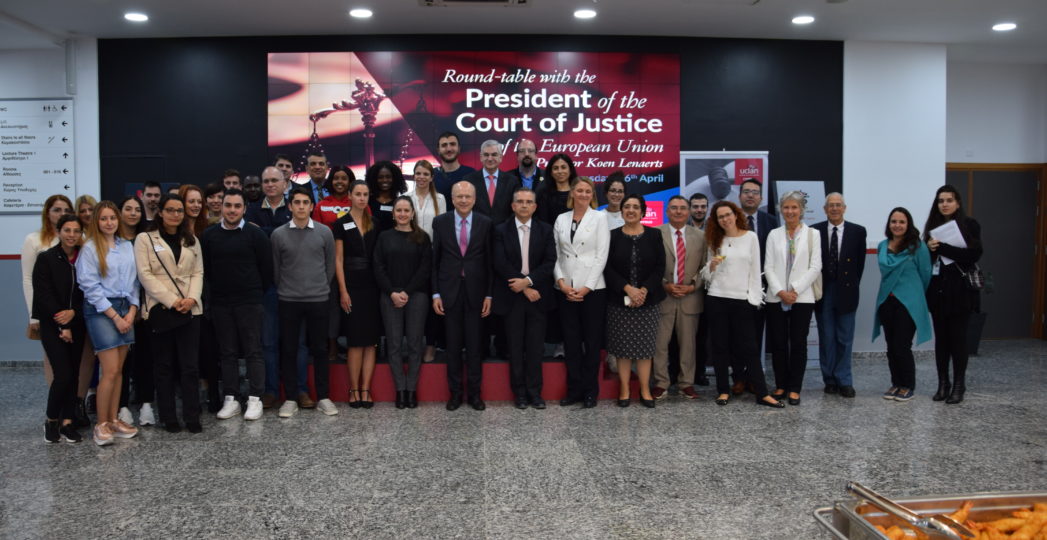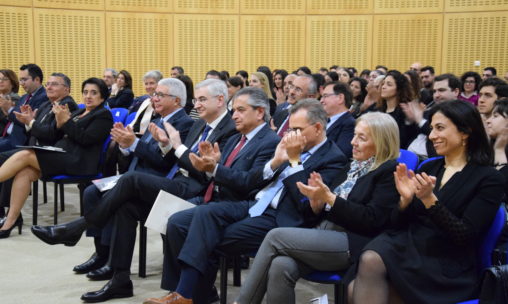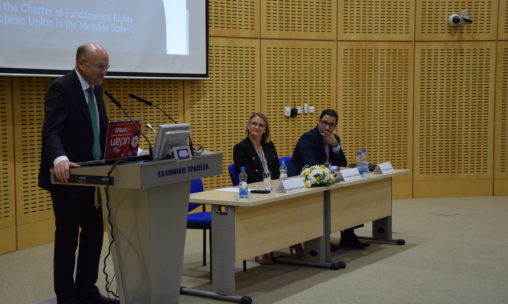On 15 April 2019, the School of Law of UCLan Cyprus and the Law Department of the University of Cyprus proudly co-organised a public lecture by Professor Koen Lenaerts, the President of the Court of Justice of the European Union. His lecture was entitled “The role of the Charter of Fundamental Rights of the European Union in the Member States”. It was delivered at the Paschalis Paschalides Hall of the Hellenic Bank Head Office Building in Nicosia. A transcript of his speech may be found here.
A welcoming address was
co-delivered by Professor Irene-Anna Diakidou, Vice-Rector for Academic Affairs
of the University of Cyprus, and Professor Stéphanie
Laulhé Shaelou, Professor of European Law and Head
of the School of Law of UCLan Cyprus. Mr.
Costas Clerides, Attorney General of
the Republic of Cyprus, then took the floor to deliver an Opening Speech. The Attorney General stressed the importance
of the Charter of Fundamental Rights of the European Union (‘the Charter’) and
its role in the national courts of member states of the EU, such as the
Republic of Cyprus. He also pointed to
the importance of judicial dialogue between the national and the EU Courts,
especially through preliminary references.
The event
was convened by Professor Stéphanie Laulhé Shaelou, and co-chaired by Dr. Constantinos Kombos of
the University of Cyprus.
The public lecture by the President of the Court of Justice of the EU explored the impact and the role of the Charter in the legal orders of the Member States in three different perspectives. Professor Lenaerts firstly explored the question of competences between the EU and its Member States in the field of fundamental rights protection; in this context, he dwelt on Article 51(1) of the Charter. Professor Lenaerts then focused on the level of protection provided by national law and the cases when such law is a higher form of law than the Charter. Lastly, he explored the question of the horizontal application of fundamental rights. A discussion followed the public lecture and a reception closed the event.
On 16 April 2019, Professor Koen
Lenaerts, President of the Court Justice of the European Union, also honoured UCLan
Cyprus with his presence. His visit began with a tour of the village of Pyla in
the UN-controlled buffer zone. During
his tour of Pyla, the President was accompanied by his delegation of visiting
judges, as well as by academics and Honorary Fellows of the School of Law of UCLan
Cyprus. They provided the visiting delegation with a historical analysis of the
village, its mixed population, its sensitive geographical location and its
politico-legal significance. According
to the United Nations, Pyla is one of only six villages in the buffer zone
and the only one of these which is ‘a mixed village’.
After the tour, Professor Lenaerts and his delegation visited the University’s premises to take part in a student-focused Roundtable discussion involving members of his delegation, students, as well as academics and Honorary Fellows. Professor Lenaerts led the discussion by delivering a talk entitled “The role of the Court of Justice in enhancing data protection in the European Union”. Professor Lenaerts gave an enlightening and detailed account of the Court’s approach in this era of digital revolution. He focused on respect for individual privacy, the protection of personal data and the so-called right to be forgotten. A transcript of his talk can be found here. The students and the academics of the School of Law had the privilege to ask questions and discuss the latest judgments of the Court of Justice of the EU. Professor Koen Lenaerts and other judges present were only too happy to respond and to comment on the future developments on data protection when interpreting the vast and complex set of rules contained in the GDPR. A video recording of the full event can be found here. A reception for the participants closed the event.
On behalf of the academics, students and
other attendees at both of the aforementioned events, UCLan Cyprus hereby
thanks the President of the Court Justice of the European Union for his public
lecture in Nicosia, for enabling the two aforementioned transcripts to enter
the public domain and for his contribution to the education of students at UCLan
Cyprus and elsewhere. UCLan Cyprus also
thanks the University of Cyprus and the Hellenic Bank for their kind
co-operation in connection with the public lecture.






